- Преподавателю
- Иностранные языки
- Where do tigers come from ? 5 cынып
Where do tigers come from ? 5 cынып
| Раздел | Иностранные языки |
| Класс | 5 класс |
| Тип | Другие методич. материалы |
| Автор | Аякоз Б.К. |
| Дата | 28.01.2016 |
| Формат | docx |
| Изображения | Есть |
Сабақтың тақырыбы: ''The green world''
Сабақтың тақырыбы: ''The green world''
Мақсаты: 1.Балаларды ағылшын тілінде қоршаған ортамен таныстыру.
2.Аңдарды, Жер планетасын қорғауға сүйіспеншіліктерін ояту.
3.Оқушылардың оқу, сөйлеу, ойлау қабілеттерін дамыту.
1.Ұйымдастыру кезеңі: Greetings.
-
Good morning,children!
(Who is on duty today? Who is absent?)
2.Сабақтың барысы:
Let's begin our lesson. Look at the blackboard. Read the epigraph to our lesson.(Эпиграф).
«I'm the part of the world and the world is a part of me».
How do you understand these words? What does it mean?
-
Үй жұмысы тексеру:
Plural form of nouns (rule)
Words - animals (look at the picture and name the animal. Give the plural form of it)
-
Жаңа тақырыпты меңгеру:
Ex. 2, p.52-53
Жаңа сөздер
Special-ерекше
Pollute- ластау
Dumb- ақылсыздық
Мәтінмен жұмыс. (оқу және аударма)
Read the letter. Translate the text.
Answer the questions. Ex3, p.53
Оқушыларға қойылатын қосымша сұрақтар:
a\Do you like the poem?
What does American girl ask for?
What should we do to make the Earth better?
Oh, look how beautiful our planet will be if we only help it. Together we can make the world better.
The Earth's day is on the 22nd of April.
b\ We have in our land 8 reserves. They are: Aksu-Zhabagaly, Almaty, Markhakol, the West Altay, Khorgalzhyn, Nauryzym, Barsakelmes, Ustirt. In the future will be created another 9 reserves. They are Karatau, Betpakdala, Torgay. Alakol, Zhongar, Zaysan, Balkhash River, Khysylkhum and Ereimentau. In these reserves are many animals and people work with animals all day.
-
Грамматиканы қайталау.
Past Simple
Қолданылатын кездері. Жасалуы
Ех.1
1. watched, he, yesterday, TV.
2. helped, the house,last Sunday, Ann, about
3. Мен кеше үй жұмысын істедім.
4. Ол 2 ай бұрын Астанада болды
Irregular verbs. дұрыс және бұрыс етістіктер
Слайдтардан бұрыс етістіктердің формаларды жасау.
Present Perfect Continuous
Қолданылатын кездері. Жасалуы
Ех.2
Мен ағылшын тілін бес жылдан бері үйреніп жүрмін.
Асхат 10 жасынан бастап компьютер ойнап жүр.
How long ____ you _____ (learn) English?
I love music. I _____ (play the dombra) since I was 9.
This crossword is difficult. I ____ (do) it for 40 minutes.
-
қорытынды.
-
Үй жұмысы
a\ех.8, р54 оқу
ереже қайталау.
Ағылшын тілі пәнінен ашық сабақтар жинағы:
Step three. ADVERTS
Form: 8 Step three. ADVERTS Form: 8 ШҚО,Азгөз ауданы ,Айғыз ауылы «Айғыз жалпы білім беретін орта мектеп» КММ-нің ағылшын тілі пәнінің мұғалімі
The aim of the lesson: 1) To develop pupils' abilities in speech. 2) To develop children's memory, thinking, creative abilities and vocabulary. 3) To enrich children's knowledge concerning the theme. 4) To demonstrate the task volunteers ask them the questions. 5) To encourage them to note down their classmate's answers 6) To clear up pronunciation Method: explanation, speaking, writing, answering the question, listening, sings a song.
Equipment: an interactive board, slide, map.
Visual aids: Placard, cards with new words.
Outline of the lesson I. Organization moment: Teacher: Good afternoon, students! Pupils: Good afternoon, teacher!
II. Checking up homework Teacher: What was our home work for the last lesson? Writing.
Answer the questions: (Using interactive board) Read the texts again and answer the questions:
1. Who doesn't like walk's in the country?
2. Whose favourite TV programme is Doctor Who?
3. Who lives in Wales?
4. Who goes cycling?
5. Who lives in England?
6. Whose favourite foods are pizza and pasta?
III. Listening of the text, reading it and discussion of it Lots of people pretend that they never read advertisements, but this is doubtful. It is hardly possible not to read advertisements these days. And what fun they often are! Just think what a railway station or a newspaper would be like without advertisements. A cheerful witty advertisement makes us happy. Advertisements perform a useful service to the community for instance, you can find a job, buy or sell a house, announce a birth, marriage or death in "Small ads" columns. No other item in a newspaper provides such entertaining reading or offers such a deep insight into human nature. There are advertisements practically everywhere you look in the city or a village.
II. Express your opinion about the following statements:
1. Any kind of advertising should be banned from the media.
2. Some advertisements are great fun, especially those that are shown in cinema.
3. Advertising changes our style of living.
4. Every advertisement is a big lie.
5. Many advertisements promise a lot more than there is to the product.
6. Advertising for tobacco and alcohol should be forbidden. Grammar: Modal Verb Could + Perfect Infinitiv. Modal Verbs Could + Perfect Infinitive is used for events which were possible in the past but didn't happen.
Examples: 1. He could have drowned! (it was possible for him to drown but it didn't happen).
2. You could have done it 10 times better (but it didn't).
3. The boy could have passed his exams but that morning he was late because of the traffic jam!
4. They could have saved the man but the ambulance car came too late.
5. She could have won the prize but luck was againt her.
III. Grammar Practice: 1. Say it in English. 1. Ол суға батып кетуі мүмкін еді, 6ipaқ, ағасы құтқадрып қалды. 2. Ол жарыста оңай жеңіске жетер еді, 6ipaқ, оның жолы болмады. 3. Хабарласуына болар еді ғой. Неге хабарласпадың? Біз уайымдадық. 4. Бородин жақсы химик болар еді, алайда ол атақты компо¬зитор болды. 2. Say 3 sentences of what eould have taken place in the past but it didn't happen. Example: The film has disappointed me: the young man could have become rich but he didn't. The girl could have become a star but she didn't. They could have married but this didn't happen. What a life! Grammar: Modal Verb should + Perfect Infinitive shows that Modal Verb should + Perfect Infinitive shows that the action was desirable but it didn't happen. Example: 1) I should have worn a tie for the job interview (It was a good idea but I didn't do it). 2) I should have invited him to the party (It was a good idea for me to do so but I didn't do it). 3. You should have been more polite with the boy! 4. You shouldn't have gone there so late at night. 5. You shouldn't have missed the lessons. IV. Grammar practice 1. Say it in English. 1. Кеше сен ол жерге бармауың керек еді. 2. Төсекте жата тұруың керек еді .Сен тұмауратып тұрсың. 3. Сынакка жаксырак, дайындалу керек еді. Ал енді сен "екілік" баға алдың. 2. Speak on the following situations. a) - Your friend failed his exam. Express your reproach (жазгыру) and give some pieces of advice. b) - You have been told that your friend while playing football in the yard broke the window glass. Express your attitude to what has happened. c) - Your little brother has been watching TV all day long and hasn't done his duties about the house. Express your attitude to his behaviour. d) Suppose you saw such an advertisement in a magazine. Y.Homewor.1) Homestay language holidays! The natural way by staying with an English host-family as a paying guest. We have carefully selected families in the South - West of England to match your age, interests and background. 2) International Summer Schools! Brush up your English. 20 lessons per week. Interesting social programmes. - Write a letter asking for additional information.
Простое прошедшее время в английском языке. Правильные и неправильные глаголы. Past Simple. Regular and Irregular verbs
Яндекс.Директ
 Самоучитель английского языка!Как быстро и эффективно изучить английский. Самоучитель.zamjatkin.com
Самоучитель английского языка!Как быстро и эффективно изучить английский. Самоучитель.zamjatkin.com
Здесь вы можете пройти урок: Простое прошедшее время в английском языке. Правильные и неправильные глаголы. Past Simple. Regular and Irregular verbs
В этом уроке мы познакомимся с правильными и неправильными глаголами в английском языке и с тем, как их использовать в предложенияхпростого прошедшего времени. Именно эти глаголы в большинстве случаев являются составной частью прошедшего времени.
Чтобы выразить мысли в прошлом, англичане часто прибегают к глаголам was и were. Ну а как же быть, если основное действие выражено другим глаголом, например, плавать, или играть? Вот в таких случаях требуется знание правильных и неправильных английских глаголов. Мы рассмотрим каждую категорию глаголов в отдельности:
Правильные глаголы (Regular verbs) - это особая группа английских глаголов, которая легко образует прошедшее время с помощью добавлениясуффикса -ed к инфинитиву (обычной форме глагола). Вот несколько примеров таких глаголов:
talk - talked (говорить - говорил)
jump - jumped (прыгать - прыгал)
check - checked (проверять - проверял)
look - looked (смотреть - смотрел)
stay - stayed (останавливаться - останавливался)
ask - asked (спрашивать - спрашивал)
show -showed (показывать - показывал)
work - worked (работать - работал)
Правильные глаголы с окончанием -ed не изменяются по лицам или числам. Рассмотрим на примере глагола walk (гулять, прогуливаться):
I walked - я гулял
you walked - ты гулял/ Вы гуляли
he walked - он гулял
she walked - она гуляла
it walked - он/ она гулял/ гуляла (неодушевлённые)
we walked - мы гуляли
they walked - они гуляли
I. Существуют некоторые правила правописания при добавлении окончания -ed.
1. Так, например, если глагол уже оканчивается на букву -e, то к нему добавляется только -d. Например:
change - changed (поменять - поменял)
arrive - arrived (прибывать - прибыл)
smoke - smoked (курить - курил)
2. Если глагол оканчивается на букву -y, то окончание, за редким исключением, изменяется на -ied. Например:
study - studied (учить - учил)
tidy - tidied (убирать - убирал)
try - tried (пытаться - пытался)
Исключение составляют глаголы: play - played (играть), stay - stayed (останавливаться), enjoy - enjoyed (наслаждаться).
3. В некоторых коротких глаголах (в 1 слог) при добавлении окончания -ed удваивается согласная. Это правило относится к глаголам, которыеоканчиваются на одну гласную и одну согласную буквы. Например:
stop - stopped (остановиться - остановился)
rob - robbed (ограбить - ограбил)
II. Касательно правильных английских глаголов есть также несколько правил чтения.
1. Так, например, в глаголах, оканчивающихся на глухой согласный звук (f, k, p, t), окончание -ed читается мягко, как /t/. Например:
walked /wɔ:kt/
looked /lukt/
jumped /dʒʌmpt/
asked /a:skt/
2. В глаголах, оканчивающихся на звонкие и все остальные звуки, окончание -ed читается звонко, как /d/. Например:
played /pleid/
showed /ʃəud/
arrived /ə'raivd/
changed /tʃeindʒd/
3. Произношение окончания глагола -ed немного изменяется, когда глаголы оканчиваются на звуки /t/ или /d/. Тогда окончание произносится /id/. Например:
decided /di'saidid/
waited /'weitid/
landed /'lændid/
faded /'feidid/
Теперь рассмотрим правильные глаголы в утвердительных предложениях. Вот несколько примеров:
Miriam waited for Adam for several hours. - Мириам ждала Адама в течение нескольких часов.
She walked towards the river. - Она пошла по направлению к реке.
They changed their mind. - Они поменяли своё решение.
The woman carried a heavy bag. - Женщина несла тяжёлую сумку.
When I arrived the party was over. - Когда я пришла, вечеринка закончилась.
The plane landed near the village. - Самолёт приземлился вблизи деревни.
The car stopped next to my house. - Машина остановилась рядом с моим домом.
Children played hide-and-seek. - Дети играли в прятки.
We stayed at my grandmother's. - Мы остались у моей бабаушки.
I looked around but there was noone. - Я осмотрелся, но никого не было.
He studied German at school. - Он изучал немецкий в школе.
Как видно из примеров, место подлежащих и глаголов в утвердительных предложениях фиксированное, а остальные члены предложений могут употребляться в зависимости от контекста. При чтении примеров, обращайте внимание на правописание правильных глаголов и их произношение.
В противовес правильным глаголам, в английском есть также целый ряд неправильных глаголов, которые не подчиняются правилу добавления окончания -ed, а образуются совершенно неожиданно и по-разному. Например:
find - found (находить - нашёл)
take - took (брать - взял)
sleep - slept (спать - спал)
fight - fought (драться - дрался)
get - got (получать - получил)
give - gave (отдавать - отдал)
buy - bought (покупать - купил)
catch - caught (ловить - поймал)
lose - lost (терять - потерял) и многие другие.
Здесь можно найти полный список наиболее употребимых неправильных глаголов
В простом прошедшем времени используются глаголы из второй колонки (Past Simple).
В утвердительных предложениях неправильные глаголы употребляются также, как и правильные. Порядок предложения фиксированный: Подлежащее (Subject) - Сказуемое (Predicate) - Дополнение (Object) - Обстоятельство (Adverbial modifier). Рассмотрим на примерах:
He lost his key a day ago. - Он потерял свой ключ день назад.
Simon took my phone number yesterday. - Саймн взял у меня номер телефона вчера.
I gave her a birthday present. - Я подарила ей подарок на день рождения.
They slept for eight hours last night. - Они спали восемь часов прошлой ночью.
Для образования отрицательных и вопросительных предложений с правильными и неправильными глаголами (кроме to be и модальных глаголов) обязательно используется вспомогательный глагол did.
Так, например, в вопросительных предложениях на первое место ставится вспомогательный глагол did, затем подлежащее и глагол, но уже в своей первоначальной форме (инфинитив), так как вспомогательный глагол did забирает на себя функцию прошедшего времени. Рассмотрим несколько примеров:
(+) Her watch stopped working. - Её часы перестали работать.
(?) Did her watch stop working? - Её часы перестали работать?
(+) He caught a big fish. - Он поймал большую рыбу.
(?) Did he catch a big fish? - Он поймал большую рыбу?
(+) They played cards in the evening. - Они играли в карты вечером.
(?) Did they play cards in the evening? - Они играли в карты вечером?
(+) Mr.Right found a purse with money. - Мистер Райт нашёл кошелёк с деньгами.
(?) Did Mr.Right find a purse money? - Мистер Райт нашёл кошелёк с деньгами?
(+) His father called him yesterday. - Его отец позвонил ему вчера.
(?) Did his father call him yesterday? - Его отец позвонил ему вчера?
Как видно из примеров вспомогательный глагол did не изменяется по лицам или числам, как, например глаголы, do и does, was и were. Также эти вопросы относятся к категории общих, и требуют кратких ответов, которые в отличие от русских "да" и "нет" зависят во многом от самого вопроса и вспомогательного глагола. Рассмотрим подробнее:
Did you leave early last night? -Yes, I did. -No, I didn't. - Ты ушёл рано прошлой ночью? -Да. -Нет.
Did they like the cake? -Yes, they did. -No, they didn't. - Им понравился торт? -Да. -Нет.
Did their children break the remote control? -Yes, they did. -No, they didn't. - Сломали ли их дети пульт? -Да. -Нет.
Специальные вопросы с правильными и неправильными глаголами образуются в таком же порядке как и общие, но с добавлением вопросительного слова в начале. Например:
Where did you find the map? - Где ты нашёл карту?
Why did they call us last night? - Почему они позвонили нам вчера ночью?
Who did you invite to the party? - Кого ты пригласил на вечеринку?
What did she cook fro dinner? - Что она приготовила на ужин?
Отрицательные предложения с правильными и неправильными глаголами также образуются с помощью вспомогательного глагола did, и отрицательной частицы "not". Основные глаголы в таких предложениях остаются в своей первоначальной форме, т.е. в инфинитиве. Рассмотрим на примерах:
(+) He wanted us to go. - Он хотел, чтобы мы ушли.
(-) He didn't (did not) want us to go. - Он не хотел, чтобы мы уходили.
(+) They enjoyed the concert. - Им понравился концерт.
(-) They didn't enjoy the concert. - Им не понравился концерт.
(+) Albert promised me something. - Альберт мне кое-что пообещал.
(-) Albert didn't promise me anything. - Альберт мне ничего не обещал.
(+) My friend paid the fine. - Мой друг уплатил штраф.
(-) My friend didn't pay the fine. - Мой друг не уплатил штраф.
(+) It broke after all. - И всё-таки это сломалось.
(-) It didn't break after all. - И всё-таки это не сломалось.
Как видно из примеров слово did можно соединять с частицей not, и тогда получается сокращённая форма - didn't.
Таким образом, мы рассмотрели правильные и неправильные глаголы в английском языке, также ознакомились с их употреблением в утвердительных, отрицательных и вопросительных предложениях. Категория правильных глаголов не требует целенаправленного запоминания, а вот неправильные глаголы рекомендуется учить п
The Simple Present Tense (Жәй Осы Шақ)
Жарияланды 19-01-2016, 07:32 Категориясы: Ағылшын тілі
Оқытушы: Нугманова М.З.
Оқу тобы: Атс - 13о
Сабақтың тақырыбы: The Simple Present Tense (Жәй Осы Шақ)
Текст: We learn foreign languages
Сабақтың түрі: аралас сабақ
Сабақтың әдісі: сын тұрғысынан ойлау, сұрақ - жауап әдісі, деңгейлеп саралап оқыту, дамыта оқыту, түсіндірмелі, ойын элементтері.
Пәнаралық байланыс: қазақ және орыс тілдері, халықтық педагогикамен байланыс, музыка, этика, эстетикамен байланыс.
Сабаққа бөлінетін уақыт: 80 минут.
Сабақтың мақсаты:
а) білімділігі: оқушылардың жай осы шақтың құрылымын, жасалу жолын түсінуі, етістіктің сөйлемде қолдануылуын меңгеруі, өткен грамматикалық тақырыптармен толықтыра отырып, жәй осы шаққа сәйкес ситуация құрастыра білуі, сөздік қорын дамыту.
ә) тәрбиелік мәні: оқушылардың шетел тілін меңгеруге қызығушылығын арттыру, мәдениеттілікке, жауапкершілікке, ізденуге баулу.
б) дамытушылығы: оқушылардың есте сақтау қабілетін арттыру, логикалық ойлауын, еркін сөйлеуін, тілді меңгеруде аударма жұмысына (оқу, тыңдау арқылы) түсінуіне қалыптастыру, сөздік қорын байыту.
Сабақтың көрнекілігі: интерактивті тақта, флипчарттар, электрондық оқулық, слайдтар.
Қолданылған оқулықтар: 1. English for Businessmen. Г. А. Дудкина
2. Английский для секретарей и менеджеров. С. А. Шевелева.
3. Практический курс английского языка В. Д. Аракина
4. Учебник английского языка Н. А. Бонк
Сабақтың өткізілу барысы
I. Ұйымдастыру кезеңі
II. Тіл сындыру жаттығуы
III. Фонетикалық жаттығу «Sailor»
IV. Үй жұмысын сұрау (текст « Nick`s flat» жаңа сөздер, Jigso әдісі арқылы)
V. Жаңа грамматикалық тақырыпты түсіндіру. The Simple Present Tense
VI. Жаңа тақырыпқа сәйкес жаттығулар орындау ex. 4 - 6 p. 48 - 49
VII. Диаграмма құру. «Meals» (өткен тақырыппен байланыстыра отырып )
VIII. Жаңа сөздерді түсіндіру (етістіктің іс - әрекетке қатысын суреттерді пайдалану арқылы.)
IX. Жаңа текстті түсіндіру. «We learn foreign languages»
X. Электронды оқулықты пайдалану арқылы жаттығулар орындау. (ойын элементері)
XI. Жай осы шаққа сөйлем құрастыру.(логикалық ойлау шапшаңдық)
XII. Оқушыларды бағалау.
XIII. Үй жұмысын беру.(түсіндіру) тексті оқып, аудару, сұрақтарға жауап беру, жаңа сөздерді меңгеру, қысқаша эссе жазу.
XIV. Сабақты қорытындылау.
The lesson structure
I. The organization moment
II. Speech drill exercises
III. Phonetic drill exercises (tongue twister)
IV. Asking the home task text `` Nick`s flat`` (with a method of Jig so) new words (they`ll find the correct translation)
V. Explaining the new grammar material. The Simple Tense
VI. Doing exercises (in orally and written form) ex. 4 - 6p. 48
VII. Making up the diagram (Meals)
VIII. Studying the new words. (with the help of pictures)
IX. Explaining the new text `` We learn foreign languages``
X. Conclusion with the electronic book.
XI. Making up the sentences in the Simple Present Tense
XII. Giving marks
XIII. Giving home task (to retell the text and answer the questions, make up an essay)
XIV. The end of the lesson
The procedure of the lesson
I. The organization moment
Teacher: How are you children?
Students: We are well and you?
T: I am so fine, thank you.
I see you are all present
II. Speech drill exercises
T: Now children let`s begin our lesson. First of all let`s answer my questions please.
T: What is date today?
S: Today is the 20th of December
T: And what was the date yesterday?
S: Yesterday was the 19th of December
T: Good thank you. And next question what date will be tomorrow?
S: Tomorrow will be the 21st of December
T: That`s ok. and what day of the week today?
S: Today is Friday.
T: Thank you, very good. Now children, let`s answer my questions, please.
What season is it now? And say about today`s weather
S: It`s winter now. And it`s cold and cloudy.
T: That`s right, thank you.
III. Phonetic drill exercises
Now, children let`s take a tongue twister about sailor.
Sailor
A sailor went to sea (Вышел матрос в море)
To see what he could see, (Посмотреть, что он сможет увидеть)
And all he could see (И все, что он смог увидеть,)
Was sea, sea, sea. (Было море, море, море.)
IV. Asking their homework
T: Now, children let`s talk about our home task.
S: Our home task was the text ``Nick`s flat`` for good reading with methods of Jig so and working with new words.
T: Good, please let`s read and answer the questions (students are reading and answering the teacher`s questions)
V. Explaining the new grammar
The Simple Present Tense
Жәй осы шақ етістіктің бірінші формасы арқылы жасалады. Іс - әрекеттің күнделікті қайталанып отыратындағын білдіреді.
For example:
To read - оқу To close - жабу
To write - жазу To go - бару
To open - ашу To drink - ішу
To discuss - талқылау To eat - жеу
Сөйлемге еңгенде яғни қолданысқа түскен кезде етістіктің to частицасы түсіп қалады.
For example:
I read a book every day
We drink a milk every morning
Және 1 - ші, 2 - ші - жақ жекеше түрде және көпше түрде етістік өзгеріссіз қолданылады да, ал 3 - жақ жекеше түрде етістіктің түбіріне - s - es жұрнағы жалғанады.
For example:
He /she reads a book every day.
Сондай - ақ егерде етістік - o,- s, - ss, - sh,- ch, x әріптеріне аяқталатын болса, онда етістіктің түбіріне - es жұрнағы жалғанады.
Ағылшын тілі сабағындағы ойын және шығармашылық тапсырмалар
Жарияланды 5-03-2013, 14:32 Категориясы: Әдістемелік көмек
Оқу процессіндегі ойын және шығармашылық тапсырмалар. Шеберлік класс.
Шет тілін оқуға қызығушылықтың өсуі - қазіргі заман ерекшелігі. Қазіргі заман адамы үшін шетел тілін білуі - оның карьералық өсуінің, табысқа жетуінің, қызықты өмір сүрудің негізгі кепілі. Шетел тіліне деген қызығушылықтың өсуі ұстаздарға үлкен жауапкершілікті әкеліп жүктейді. Әр сабақтың қызықты, әрі тартымды өтуіне сабақта қолданылатын шығармашылық тапсырмалар мен ойындар қамтамасыз етеді. Қазақ халқының даналық сөзі «Ойында озған, өмірде де озады» дейді. Өйткені ойын -
• оқушылардың ойлау іс - әрекеттерін белсенді ететін оқыту құралы.
• оқушылар үшін оқу процесін қызықты әрі тартымды етуге көмектеседі.
• барлық оқушылардың белсенді қатысуын қамтамасыз етеді.
• оқушыларға өзара түсінісуге, бір - біріне көмектесуге әрі соңғы нәтижеге жету үшін береке - бірлікті нығайтады.
• оқушыларға өз сезімдерін ашық білдіруге, өздеріне деген сенімділікті нығайтуға үйретеді.
Жалпы айтқанда ойын тілді меңгеруге арналған өте мықты құрал.
Ойынды сабақта өткізудің өз талаптары бар. Ойын кез - келген уақытта ойнатылуы мүмкін: сабақ басында, ортасында немесе аяғында. Ол өзіңіздің қойған мақсатыңызға байланысты. Егерде тақырыпты бекітуге арналаса тіпті 20 - 25 минутыңызды арнауға болады, ал келесі жолы сол ойын қайталауға арналас, оған аз уақыт жұмсалады. Ойынға қойылатын негізгі талабы ойын ережесін қатаң сақталуы (карточканы ешкімге көрсетпейміз десек - көрсетпейміз, ойын кезіндегі тәртіп), мұғалім ойын барысында мүмкіндігінше мейірімді болу қажет (белсенділігін төмендетпеу үшін оқушыларға тәртіп бойынша ескертулер жасалмайды), оқушы өзін ойында еркін сезіну қажет. АҚШ - тың мектептерінде мұғалімдерге оқу жылының басында мынадай жадынама беріледі екен: "101 ways to praise a child".
Ойынның педагогикалық классификациясын сіздер өздеріңіз де жақсы білесіздер. Оны қайталаудың қажеті жоқ деп ойлаймын. Тек оқуға арналған ойын түрлерін атап өтейін:
1. Фонетикалық ойындар
Негізгі мақсаты дыбыстарды дұрыс айтуға үйрету. Әріптердің, сөздердің, мәтіннің дұрыс оқуын үйрету.
• Әріптерді дұрыс атау
• Әріптердің алфавиттегі орнын білу
• Әріптер мен дыбыстардың сәйкестігін білу
• Фонетикалық жаттығулар
• Тыңдауға арналған ойындар
ФОТОРОБОТ құрастыр.
Класс үш командаға бөлінеді, әр команда милиция жеке бөлімшесі. 3 жүргізуші таңдалады. Олар милиция бөлімшесіне досын немесе туысын тауып беруін өтінеді. Жүргізуші олардың сырт бейнесін ауызша айтады, ал милиция мүшелері оның суретін - фотороботын салады. Егерде салынған сүрет сипаттамаға сай келсе, онда адам табылды деп есептеледі.
Жүргізуші: Ican` t find my sister. She is ten. She is a schoolgirl. She is not tall/ Her hair is dark. Нек eyes are blue. She has а red coat and a white hat on.
2. Орфографиялық ойындар - сөздердің дүрыс жазылуын қалыптастыру. Бүл ойындарға: wordsearches, word spaghetti, crosswords, puzzles және ребустар жатады. (экраннан көрсетіп түсіндіру) орфографияға келесі ойындарды ойнатуға болады:
• «Телеграмма» (1 оқушы телеграфта істейді, басқа оқушылар телеграмма жібереді, ал ол болса оларды тақтаға жазып жібереді)
• «Кезекші әріп» ойыны. Бір әріп кезекші болып таңдалады. Оқушылар 2 - 3 минут ішінде сол әріптен басталатын сөздер жазып шығу керек.
• «Шашылған әріптер» (жеке әріптерден сөз құрау керек)
• «Word building» ойыны (оқушыларға ұзақ сөз беріледі, сол өзден басқа сөздер құрау керек)
3. Лексикалық ойындардың мақсаты әртүрлі жағадаяттарда қажетті лексикаларды қолдануды жаттықтыру, оқушылардың тілдік реакциясын дамыту.
Лексикалық ойындарға кроссвордтарды, board games, ребустарды жатқызуға болады. (слайдтан көрсетіп айту)
Ойын ойнату: Finding places.
Now we're going to play a game. It is called "Finding places" it is a pair game, but we shall play in another way. First I'd like to tell you how the children must play this game. As I have said it is a pair game. Pupils sit at one desk facing each other. Give the pupil A map A and the pupil B map B. Tell the students not to look at each other's maps. Say them that they have the same map. They are on the board. You see we have places marked in bold on both maps. Students should look at the list of the thing they need to do in town. Then they ask each other questions and answer them explaining where this or that place is situated using the following prepositions. Having listened the answer the student must label the correct place on their maps. When student have found all the places they will compare their maps and check their answer.
Now, we shall play this game in groups.
4. Грамматикалық ойындар. Шетел тілін оқу үй салумен тең деген екен бір ғұлама. Лексика сол үйдің кірпіші болса, грамматика сол кірпіштерді біріктіретін цемент тәріздес деген екен ол. Жалпы ойындарды лексикалық не грамматикалық, фонетикалық не орфографиялық деп бөліп жарып қаруға болмайды. Олардың барлығы да бір - бірімен тығыз байланыста. Грамматикалық ойындардың мақсаты - қиындық туғызатын нақты бір грамматикалық тақырыптар бойынша сөйлеу бірліктеріндамыту, қайталау. Мен сабақтарымда мынадай грамматикалық ойындарды қолданамын. Олар board games, talking worksheets. (слайдтан көрсетіп айту)
• Welcome to grammar casino
Materials needed: 1 copy of the game board per student
● Students start with one hundred points
●Students read the first sentence.
● Students decide if the sentence is grammatically correct or if there is a mistake.
● If the sentence is fine, the student checks the box under 'good. '
● If there is a mistake in the sentence, the student checks the box under 'no good. '
● The students then write in their bet on the bet line. If they are confident, they can bet a lot. If they aren't so confident, they can bet a little. (I generally require a minimum bet of 10 points.)
● Students wait for the answer from the teacher.
● Once the teacher tells the students the answer, they can check to see if they were correct. If they were correct, they add their bet to their point total. If they were wrong, they subtract their bet from their point total.
● Continue to the next problem and repeat.
● The student with the most points at the end of the game is the winner.
• At the track - it is the similar game. But in this game students must show if it is a spelling or grammar mistake.
• Келесі ойын «Комментатор» деп аталады (1 оқушы басқа оқушылардың іс - әрекетін айтып отырады) ойын Present Continuous тақырыбына арналаған.
• "Changes" ойыны. What has chaned? (1 оқушы сынып бөлмесінен шығады, сол уақытта бөлмеде өзгерістер болады, 2 оқушы орындарымен ауысады,
тақста сүртіледі т. б. сыртқа шыққан оқушы қайта кіріп сол өзгерістерді айтады). Ойын Present Perfect, Passive Voice тақырыбына арналған
Қазір біз ойнайтын ойынымыз "Who's got my message" деп аталады. Бұл ойын Reported speech тақырыбына арналған. 3 - 5 адамнан тұратын топтар құрылады, бірақ әр ойыншы жеке ойнайды. Барлық ойыншыларға sender cards беріледі, және әр ойыншыға бір message card беріледі. Оқушылар бір - біріне сұрақ қойып, хабарлама жинайды. (сұрақ - жалпы сұрақ болу керек «Have you got a message for me from my grandmother?» Егерде жауап болымды болса, жауап беруші Reported speech тақырыбын пайдаланып хабарламаны жеткізу керек. Жоқ болса «No, I haven't. May be someone else» деп жауап береді. Ең бірінші болып барлық хабарламаны жинаған адам жеңімпаз болады. Ал біз болсақ барлығымыз бір топ болып ойнаймыз. Let/s choose a boss. The others are his/her secretary for today, because his/her secretary has been ill today.
5. Рөлдік ойындар (слайдтан көрсетіп айту)
Ойынды өткізу технологиясы:
1. Ойынды дайындау
● Тақырыбы
● Оқыту мақсаты
● Ойынның қатысушыларын анықтау және рөлдерді бөлу
● Сценарийді қарастыру, қажетті көрнекілік құралды дайындау, ойынның орынын және уақытын белгілеу
2. Ойынды өткізу
• Оқыту жағдаятын жүргізу
3. Нәтижесін шығару
• Уақыты
• Оқушыларға жалпы және жеке баға беру
• рефлексия
Ойынның қандай қызықты әрі тиімді болса да, ойын оқушыларды шаршатып, эмоционалдық әсерін жоғалту мүмкін екенін ұмытпау керек. Сабақтың басынан аяғына дейін ойынмен өткізу мүмкін емес.
Ойын феномені:
Демалыс, көңіл көтеру бола тұрып, оқыту мен шығармашылыққа айналады.
Әдебиетпен таныстыру (слайдтан көрсету)
Рефлексия
The theme of lesson: Present perfect Tense(just)
The aims of lesson: Presentation new grammar materials. To enlarge pupils vocabulary, to pay attention to their pronunciation To introduce the new words and expressions the theme.
The aids of lesson: cards, note - book, markers, stickers.
Type of the lesson: question- answer, explaining;
Method of the lesson: group work, pair work;
Expected results: Pupils will know Present perfect &Past Simple (negative and question forms)and their
using.
Activities of teacher Activities of pupils Resources
Introduction
(Кіріспе) Organization moment
Greeting
I'll check the register.
Any absences?
- Good morning !
- everybody raise their hands and say «Here»/ «Present».
Beginning the lesson
(Тұсау кесер) Warm-up:
Brainstorming:
-I say a verb and you give the three forms of it.
Checking homework:
Let's see the rule! What is the Present Perfect?
1. Go - went - gone
2. Come - came - come
3. Do - did - done
4. Fly - flew - flown
5. Have - had - had
6. Run - ran - run
7. Swim - swam - swum
8. Sing - sang - sung
Messages student`s book
Messages student`s book
p.51
Theoritcal part
(Негізгі бөлім) -We can see there the sphere of the Present and the sphere of the Past. When we want to say about the action that refers both to the Present and to the Past we use the Present Perfect Tense.
-We can see there the sphere of the Present and the sphere of the Past. When we want to say about the action that refers both to the Present and to the Past we use the Present Perfect Tense.
-As I have already mentioned we use the Present Perfect Tense when we connect the Present with the Past. There can be some word that can help you understand that it is Present Perfect. They are: NEVER, EVER, JUST, ALREADY, YET. Let's remember their translation.
Task2
Answer the questions on the pictures.
Picture 1. Kate is at school now. She left home an hour ago. Look at what is happening in her house and answer the questions.
• Has she switched the iron off?
• Has she closed the fridge?
• Has she turned the water off? Is the water running?
• Has she switched the light off?
• Has she turned the gas off?
• What has she done right?
Messages student`s book
p.80
Messages student`s book
p.52
Copy -book
Conclusion part.
(Қорытынды бөлім) Practice
Look at the examples and complete the explanation
What are the most unusual things your group-mates have done?
Home work:
Giving marks:
Writing the reflection. Present perfect & past simple
• Have you ever …?
• Have you ever written a poem?
• Have you ever broken a window?
• Have you ever seen a ghost?
• Have you ever been abroad?
• Have you ever spoken to a foreigner?
• Have you ever found any money?
• Have you ever lost your key?
• Have you ever heard an opera?
• Have you ever swum in the sea?
• Have you ever read novels by Dickens?
• Have you ever conducted a lesson in German?
• Have you ever eaten avocado?
• Have you ever flown by plane?
• Have you ever played the guitar?
Exercise:4b).p.53.Reading &translating.
Work-book
Diary of pupils
Stickers Құрметті тәлімгер сайтының қолданушысы Present perfect Tense(just). - ашық сабақ тегін жүтеп көре аласыз. Тәлімгер.орг сайтындағы Present perfect Tense(just). атты материал танысу үшін берілген. Тәлімгер сайтында сіз кез-келген тақырыпта ашық сабақ, презентация рефератмақалаларды және сабақ жоспарларын таба аласыз. Present perfect Tense(just). Ағылшын тілінен ашық сабақтар материалын жүктеу сілтемесі астында жазылған. Егер сізде ашық сабақтар, рефераттар бар болса сайтта жариялауға болады
№53 Сабақтың тақырыбы: I think it's beautiful.
-
1
-
2
-
3
-
4
-
5
Сабақтың мақсаты: Оқушылардың сөздік қорын молайта
отырып жаңа сөздікпен жұмыс істеу
Табиғатты сүюге тәрбиелеу
Оқушының талдау қабілетін дамыту
Сабақ әдісі: Сұрақ-жауап
Сабақ типі: Жаңа білімді меңгерту
Көрнекілігі: Тақырыптық суреттер
Пән аралық байланыс: қазақ тілі
Сабақ барысы:
I.Ұйымдастыру
А) амандасу
Б) жоқтарды белгелеу
II. Сабақтың тақырыбымен, мақсаттарымен таныстыру.
Our theme in our lesson is "I think it's beautiful.".
III.Жаңа сабақ
Сөздік жұмыс
North [ ] солтүстік
South [ sauө ] оңтүстік
West [ ] батыс
East [ I:st] шығыс
Mountain ['mauntin] тау
Forest ['f rist] орман
Lake [leik] көл
Island ['ailәnd] арал
River ['rivә] өзен
Beach [bit ] жағажай
Cliff [klif] жартас
Exercise 2 read
Exercise 3 listen and read along
IV.Пысықтау
Exercise 4 Listen and practice.
North West
East South
There are mountains in the north. There's a beach near the cliffs.
Exercise 5 Answer the questions.
a. What does Asel dream about?
b. What do you think of Asel's island? (I think it's ...)
c. Where do you think the island is? (I think it's near ... I think it's in ...)
d. Where would you like to live on the island? (I think I'd like to live near ...)
Exercise 11 Talk to your partner
Where would you like to go in the world?
V.Бекіту
Exercise 14 Answer the questions
Where do you live?
Do you live in the south of Kazakhstan?
Do you live in the north of Kazakhstan?
Do you live in the west of Kazakhstan?
Do you live in the east of Kazakhstan?
VI. Үйге тапсырма
Exercise 15
слайда 1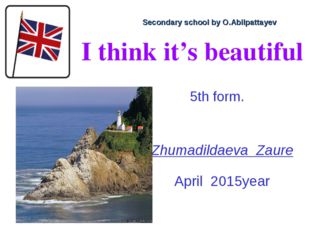
Описание слайда:
I think it's beautiful Zhumadildaeva Zaure April 2015year Secondary school by O.Abilpattayev 5th form.
№ слайда 2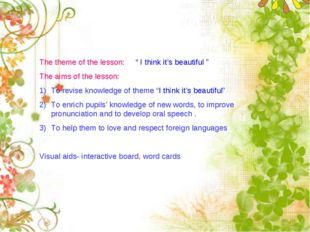
Описание слайда:
The theme of the lesson: " I think it's beautiful " The aims of the lesson: To revise knowledge of theme "I think it's beautiful" To enrich pupils' knowledge of new words, to improve pronunciation and to develop oral speech . To help them to love and respect foreign languages Visual aids- interactive board, word cards
№ слайда 3
Описание слайда:
Learn by heart. One among many couтtries Native land - mother, Native land - universe, Native land - Kazakhstan
№ слайда 4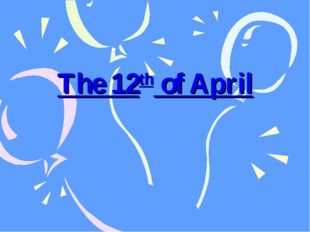
Описание слайда:
The 12th of April
№ слайда 5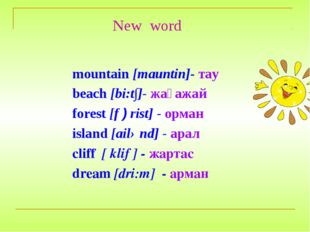
Описание слайда:
New word mountain [mauntin]- тау beach [bi:t∫]- жағажай forest [f ) rist] - орман island [ailənd] - арал cliff [ klif ] - жартас dream [dri:m] - арман
№ слайда 6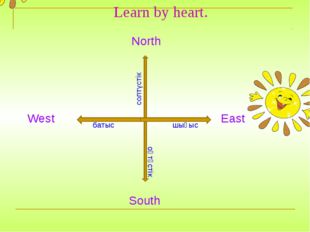
Описание слайда:
Learn by heart. West North East South шығыс оңтүстік батыс
№ слайда 7
Описание слайда:
№ слайда 8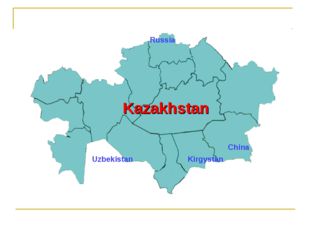
Описание слайда:
Kazakhstan Russia China Uzbekistan Kirgystan
№ слайда 9
Описание слайда:
№ слайда 10
Описание слайда:
№ слайда 11
Описание слайда:
№ слайда 12
Описание слайда:
№ слайда 13
Описание слайда:
№ слайда 14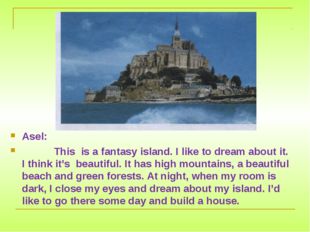
Описание слайда:
Asel: This is a fantasy island. I like to dream about it. I think it's beautiful. It has high mountains, a beautiful beach and green forests. At night, when my room is dark, I close my eyes and dream about my island. I'd like to go there some day and build a house.
№ слайда 15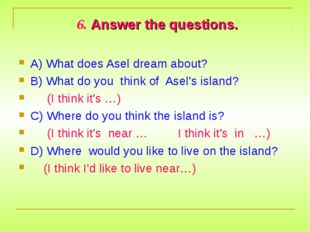
Описание слайда:
6. Answer the questions. A) What does Asel dream about? B) What do you think of Asel's island? (I think it's …) C) Where do you think the island is? (I think it's near … I think it's in …) D) Where would you like to live on the island? (I think I'd like to live near…)
№ слайда 16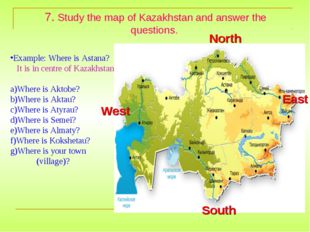
Описание слайда:
7. Study the map of Kazakhstan and answer the questions. Example: Where is Astana? It is in centre of Kazakhstan. Where is Aktobe? Where is Aktau? Where is Atyrau? Where is Semei? Where is Almaty? Where is Kokshetau? Where is your town (village)? West North East South
№ слайда 17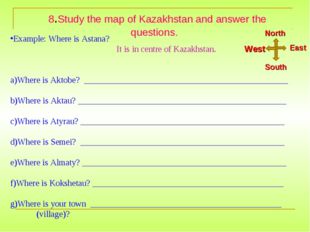
Описание слайда:
8.Study the map of Kazakhstan and answer the questions. Example: Where is Astana? It is in centre of Kazakhstan. West Where is Aktobe? _______________________________________________ Where is Aktau? ________________________________________________ Where is Atyrau? _______________________________________________ Where is Semei? _______________________________________________ Where is Almaty? _______________________________________________ Where is Kokshetau? ____________________________________________ Where is your town ____________________________________________ (village)? North East South
№ слайда 18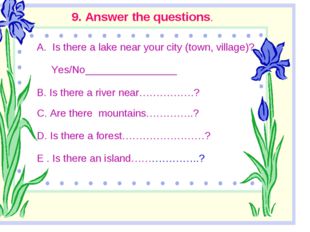
Описание слайда:
9. Answer the questions. Is there a lake near your city (town, village)? Yes/No________________ B. Is there a river near…………….? C. Are there mountains…………..? D. Is there a forest……………………? E . Is there an island………………..?
№ слайда 19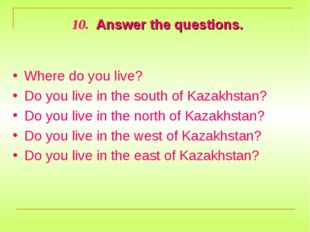
Описание слайда:
10. Answer the questions. Where do you live? Do you live in the south of Kazakhstan? Do you live in the north of Kazakhstan? Do you live in the west of Kazakhstan? Do you live in the east of Kazakhstan?
№ слайда 20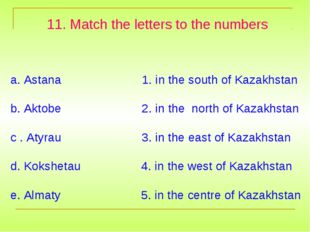
Описание слайда:
11. Match the letters to the numbers a. Astana 1. in the south of Kazakhstan b. Aktobe 2. in the north of Kazakhstan c . Atyrau 3. in the east of Kazakhstan d. Kokshetau 4. in the west of Kazakhstan e. Almaty 5. in the centre of Kazakhstan
№ слайда 21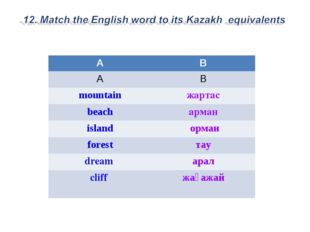
Описание слайда:
A B A B mountain жартас beach арман island орман forest тау dream арал cliff жағажай
№ слайда 22
Описание слайда:
The Houses of Parliament Akhorda White House
№ слайда 23
Описание слайда:
Tower Bridge London Eye Central Square Tower Bridge
№ слайда 24
Описание слайда:
Mosque Ak Mosque Nur Mosque
№ слайда 25
Описание слайда:
Khan Shatyry The S.Sefullin Museum Gallery
№ слайда 26
Описание слайда:
The S.Sefullin Museum The Monument of Baiterek Khan Shatyry
№ слайда 27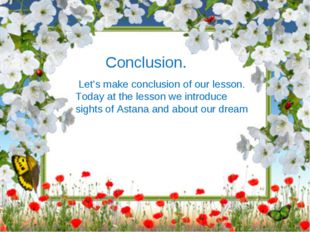
Описание слайда:
Conclusion. Let's make conclusion of our lesson. Today at the lesson we introduce sights of Astana and about our dream
№ слайда 28
Описание слайда:
Ex. 11. Write about your fantasy island English
№ слайда 29
СКАЧАТЬ МАТЕРИАЛ
Автор
Жумадилдаева Зауре Сейлхановна Описание слайда:
Дата добавления
25.01.2016
Раздел
Иностранные языки
Подраздел
Презентации
Просмотров
78
Номер материала
ДВ-375166
Получить свидетельство о публикации
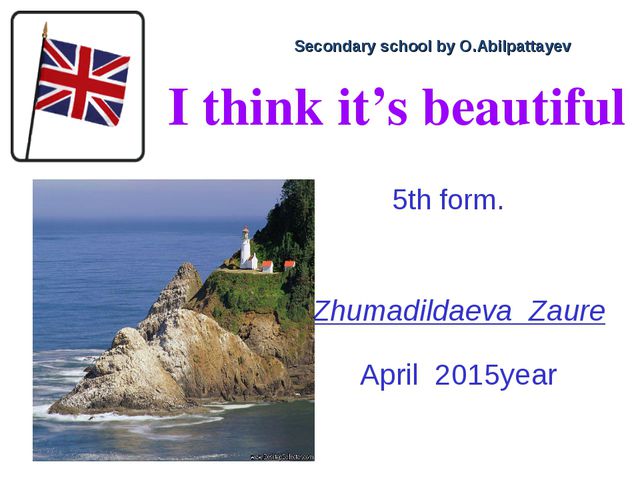
William Shakespeare immortal poet of nature
Жарияланды 6-11-2012, 14:35 Категориясы: Ағылшын тілі
The theme: William Shakespeare-immortal poet of nature
The aims:
1. To give introduction about great play writer William Shakespeare's life and works
2. To develop pupils interesting to extra curriculum works about famous people
Visual aids: slide show, cards, pictures, placards, diagram.
The type of the lesson: literature club.
Teacher: Good morning pupils. The meeting of our club is dedicated to the greatest playwright in the world literature: William Shakespeare. I hope all of you will take active part in it. At first I want you to see this presentation about Shakespeare.
Listen to some facts from William Shakespeare's biography and the time when he lived and worked.
Pupils 1: The name of William Shakespeare is known all over the world. The last half of the 16-th and 17 - th centuries are known as the Golden Age Renaissance and sometimes are called "The age of Shakespeare".
Pupil 2: People often call Shakespeare "Our national Bard", "The Immortal Poet of Nature". We really known few facts of his life and many of them are doubtful. But some facts are known to us and are proved by documents.
Pupil 3: The first facts of Shakespeare's biography are that he was born in April 23, 1564 in Stratford - on - Avon. His father was a dealer in corn, meat, wool. William's mother was a daughter of a rich farmer in the village of Wilmcote.
Pupil 4: We also know that, being 18 years old, William married Anne Hathaway, who was 9 years older5 that himself. They had a daughter Susanna and twins - son Hamlet and daughter Judith.
Pupil 5: It is known that in 1567 Shakespeare went to London, to find a job, where he began writing plays staged at the Globe Theatre. By 1592, he had been an important member of a well - known acting company.
Pupil 6: It's known that only in 1611, at the height of his fame, Shakespeare returned to Stratford, where in April 23, 1616 he died. He was buried in a fine old church in Stratford.
Teacher: You have mentioned the main facts in Shakespeare's biography. Now I'd like you to agree or disagree with some facts from William Shakespeare's life:
1. Shakespeare was born in the 17th century. Is it true?
2. William married late; his life was younger than him.
3. William Shakespeare had three children: daughter Susanna and twin sons.
4. His wife Anne Hathaway loved theatre very much.
5. William got a good education in London.
6. Shakespeare never acted on stage.
7. Shakespeare died in London and was buried in Westminster Abbey.
8. Shakespeare wrote 47plays, 154sonnets, 2 poems.
Teacher: Thank you for your answers. I see that you known Shakespeare's life rather well. As you know in London Shakespeare became an actor of the Globe Theatre and began to write plays for it. He wrote tragedies, comedies and historical plays. I'm sure that you know them well. So your next activity is to divide his plays into tragedies and comedies.(каждая группа получает по 14 карточек, в которых написаны названия пьес, все карточки перемешаны).
Comedies:
1. "The Comedy of Errors"
2. "The Taming of the Shrew"
3. "All's Well That Ends Well"
4. "A Midsummer Night's Dream"
5. "Much Ado about Nothing"
6. "Twelfth Night"
7. "The Merry Wives of Windsor"
Tragedies:
1. "Hamlet, Prince of Denmark"
2. "Othello"
3. "King Lear"
4. "Macbeth"
5. "Romeo an Juliet"
6. "Julius Caesar"
7. "Antony and Cleopatra"
Teacher: Listen to this account from one of Shakespeare's plays and tell us what play it is from. "What mostly troubled the young prince was uncertainly about his father's death. Claudius told everybody that snake had bitten the king. The young prince, however, suspected that Claudius himself had killed the king.("Hamlet, Prince of Denmark")
Teacher: What was the name of young prince? You are right. His name was Hamlet. Now listen to an extract from this famous play.
Pupil: To be, or not to be, that is the question:
Whether 'tis nobler in the mind to suffer
The sling and arrows of outrageous fortune:
Or to take arms against a sea of troubles,
And by opposing, end them? To die, to sleep,
No more, and, by a sleep to say we end
The heart - ache, and the thousand natural shocks
That flesh in hear to; 'tis a consummation
Devoutly to be wish'd. To die, to sleep-
To sleep, perchance to dream…
Быть или не быть - вот в чем вопрос,
Что благородный: думам покоряться,
Пращам и стрелам яростной судьбы,
Иль, ополчась на море смут, сразить их
Противоборством, Умереть, уснуть-
И только, и сказать, что сном кончаешь
Тоску и тысячу природных мук,
Наследие плати, - как такой развязки
Не жаждать? Умереть, уснуть - Уснуть!
Teacher: "To be, or not to be, that is the question".
Это высказывание знакомо всем, но не все знают о существовании других высказываний Шекспира.
Translate some of them:
1. The beginning of the end - начало конца
2. The whiling of time - превратности судьбы
3. There's the rub - вот в чем загвоздка
4. All is well that ends well - все хорошо, что хорошо кончается
5. To win golden opinions - заслужить благоприятное мнение
I know I want to know I have learnt
He was born on April 23, 1564 in Stratford-on-Avon. He married Anne Hathaway, who was 9 years older that himself. Why did he write a lot of tragedies Shakespeare wrote 47 plays, 154 sonnets, 2 poems?
Shakespeare wrote many sonnets. They are very popular and loved by our people. All of them were translated into different languages. Listen to some of them.
(Ученики читают любимые сонеты Шекспира).
Teacher: The meeting of our club is over. Thank you for taking active part in it. Good bye!
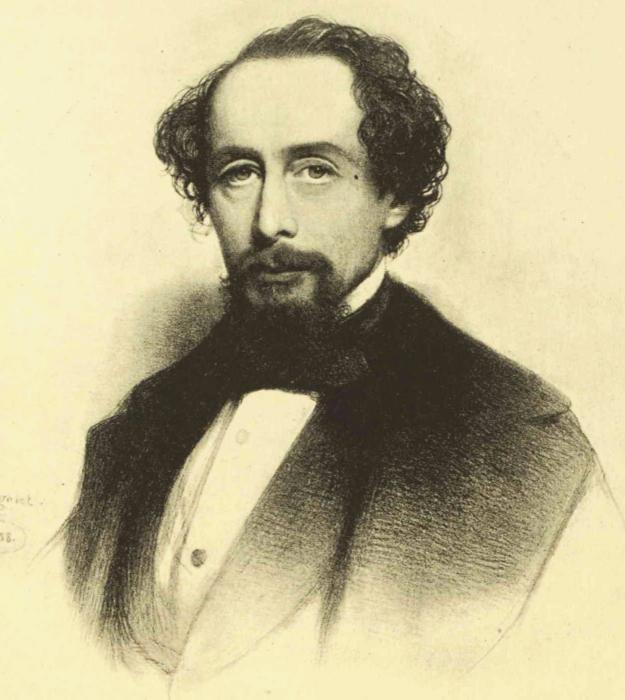
Чарльз Диккенс
Писатель-романист
Ча́рльз Джон Ха́ффем Ди́ккенс - английский писатель, романист и очеркист. Самый популярный англоязычный писатель при жизни. Классик мировой литературы, один из крупнейших прозаиков XIX века. Википедия
Родился: 7 февраля 1812 г., Лендпорт, Портсмут, Великобритания
Умер: 9 июня 1870 г., Хайэм, Великобритания
Фильмы: Рождественская история, ещё
Пьесы: Повесть о двух городах, В тупике, Замёрзшая глубина,Гоблины
Оказали Влияние: Уильям Шекспир, Виктор Мари Гюго, ещё
Книги
Ещё 10+
Большие надежды
1861 г.
Приключения Оливера Твиста
1837 г.
Посмертные записки Пиквикск...
1836 г.
Николас Никльби
1838 г.
Наш общий друг
1865 г.
Похожие запросы
Ещё 15+
Люси Монтгомери
Марк Твен
Уильям Шекспир
Роберт Льюис Стивенсон
Чарлз Дарвин
Charles Dickens is much loved for his great contribution to classic English literature. He was the quintessential Victorian author. His epic stories, vivid characters and exhaustive depiction of contemporary life are unforgettable.
His own story is one of rags to riches. He was born in Portsmouth on 7 February 1812, to John and Elizabeth Dickens. The good fortune of being sent to school at the age of nine was short-lived because his father, inspiration for the character of Mr Micawber in 'David Copperfield', was imprisoned for bad debt. The entire family, apart from Charles, were sent to Marshalsea along with their patriarch. Charles was sent to work in Warren's blacking factory and endured appalling conditions as well as loneliness and despair. After three years he was returned to school, but the experience was never forgotten and became fictionalised in two of his better-known novels 'David Copperfield' and 'Great Expectations'.
Like many others, he began his literary career as a journalist. His own father became a reporter and Charles began with the journals 'The Mirror of Parliament' and 'The True Sun'. Then in 1833 he became parliamentary journalist for The Morning Chronicle. With new contacts in the press he was able to publish a series of sketches under the pseudonym 'Boz'. In April 1836, he married Catherine Hogarth, daughter of George Hogarth who edited 'Sketches by Boz'. Within the same month came the publication of the highly successful 'Pickwick Papers', and from that point on there was no looking back for Dickens.
As well as a huge list of novels he published autobiography, edited weekly periodicals including 'Household Words' and 'All Year Round', wrote travel books and administered charitable organisations. He was also a theatre enthusiast, wrote plays and performed before Queen Victoria in 1851. His energy was inexhaustible and he spent much time abroad - for example lecturing against slavery in the United States and touring Italy with companions Augustus Egg and Wilkie Collins, a contemporary writer who inspired Dickens' final unfinished novel 'The Mystery of Edwin Drood'.
He was estranged from his wife in 1858 after the birth of their ten children, but maintained relations with his mistress, the actress Ellen Ternan. He died of a stroke in 1870. He is buried at Westminster Abbey.


